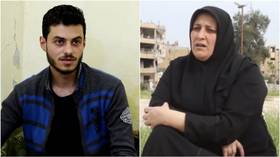‘Like living in prison’: Refugees from jihadist-ruled Idlib share stories of oppression

No one felt safe under the brutal rule of an Al-Qaeda-linked group holed up in Syria’s Idlib, refugees from the area told RT’s Ruptly video agency. Russia has warned that terrorists in Idlib are a threat to peace and security.
“The situation in Idlib, where we used to live, was like living in a prison – in every sense of the word,” Mahmoud Abdel Hamid, who managed to flee the area, told Ruptly.
Idlib, a major city in Syria’s northwest, and the territory around it are largely controlled by Hayat Tahrir al-Sham (HTS), an offshoot of Al-Qaeda in Syria formerly known as Al-Nusra Front. The group has cracked down on any dissatisfaction that has been voiced.
The moment you express your objection, you will be arrested and no one will be able to learn about your situation any more, even your first-degree relatives, like your brother. They will not disclose any information to them.
Um Heidar, who also escaped HTS rule, described how the jihadists used to “rob” the locals, and forced women to wear veils and gloves.
They made our life miserable. They prevented girls from going to school.
“We were forced to stay at home and not to go out or talk to anyone,” another woman said.
Also on rt.com Erdogan says Syria’s Idlib ‘won’t become conflict area again,’ as Damascus repels militant attack in de-escalation zoneThe militants did not even allow male doctors to treat female patients, Ayman Tybbieh explained. If that happened, the doctor was “beaten up with a whip and deported directly to the central prison.”
Khalifeh al-Hasan recalled how “no one was feeling safe” living under HTS in Idlib because “at any second they might be kidnapped for different reasons.”
Idlib remains the last stronghold of the forces fighting against President Bashar Assad. Along with HTS, pro-Turkish armed groups are present in the area. In March, Moscow and Ankara agreed a ceasefire and joint patrols in Idlib. However, the Russian Army has repeatedly reported that HTS has been violating the ceasefire by shelling local villages, as well as Russian and Syrian troops.
Last month, Russian Foreign Minister Sergey Lavrov warned that the presence of a “wasps’ nest of terrorists” in Idlib threatens the peace and security of civilians and personnel alike.
Think your friends would be interested? Share this story!














